These famous KKK members reached the highest ranks of power in the U.S. government and shaped our history.
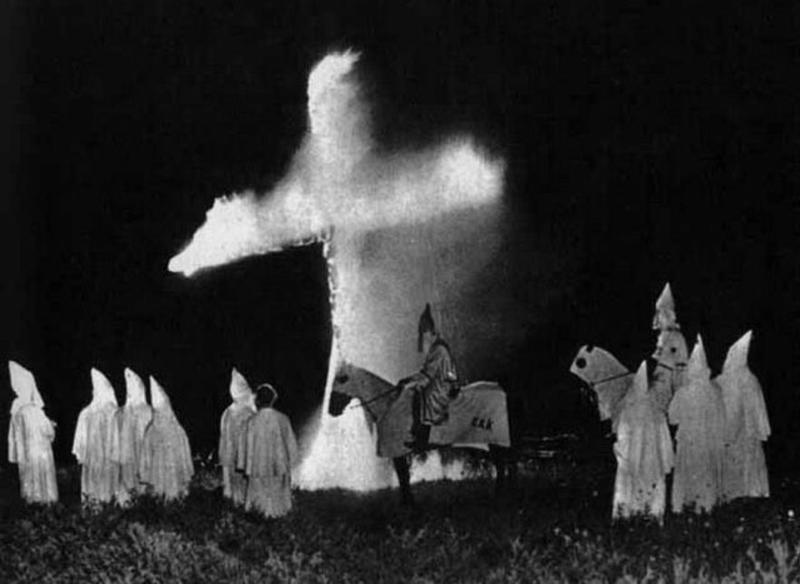
Internet message boards have been hot this month with Anonymous’ alleged hacking of the Ku Klux Klan’s Twitter account.
As befits an Internet phenomenon, much of what has been published so far is unsubstantiated, but several prominent public figures have been accused of secret membership in the KKK, including several pro-civil rights mayors and Representative John Cornyn (R-TX), the current House Whip.
Needless to say, everybody who has commented on the outing so far has denied being affiliated with the KKK, which you’d expect from politicians with something to lose.
In the context of American politics, however, the fact that membership in the KKK is now considered a career-ending liability is a relatively new phenomenon.
Just a few generations ago, membership in the 5 million-strong KKK brought aspiring politicians money, legitimacy, and easy electoral victories. It’s hardly surprising, therefore, that so many American public figures have been members of the secret empire of the Klan:
Famous KKK Members: Senator Robert Byrd

Former U.S. Senator Robert Byrd. Image Source: Wikimedia Commons
Robert Byrd was a force to be reckoned with in the U.S. Senate, where he broke virtually every record for longevity and continuous service. By the time he died, in 2010, Byrd had been in the Senate for 52 years, with eight more in the House.
He was the last living senator to have voted to add a state to the Union, he was the only senator to have cast over 18,000 votes, and in his 60-plus years of public service, Byrd never once lost an election. Unfortunately, that last record includes the time he was unanimously elected Exalted Cyclops of the KKK chapter he founded and built into a major force.
In 1946, then-Congressman Byrd wrote a letter to Senator Theodore Bilbo, who was as close to a mentor as Byrd had.
In that letter, Byrd asserted that integration of the military was a huge mistake, and that he would rather “die a thousand times, and see Old Glory trampled in the dirt never to rise again, than to see this beloved land of ours become degraded by race mongrels, a throwback to the blackest specimen from the wilds.”
Byrd wasn’t kidding. By the time he wrote that letter, he had already recruited at least 150 of West Virginia’s power elite into a Klavern (local KKK unit) with himself at its head. In 1952, with the winds of change already blowing, Byrd claimed in an interview to have quickly become disillusioned with the KKK, and to have dropped out by 1943. Even if that account is true, it doesn’t explain why, in 1946, Byrd wrote the following to the Grand Wizard:
“The Klan is needed today as never before, and I am anxious to see its rebirth here in West Virginia and in every state in the nation.”
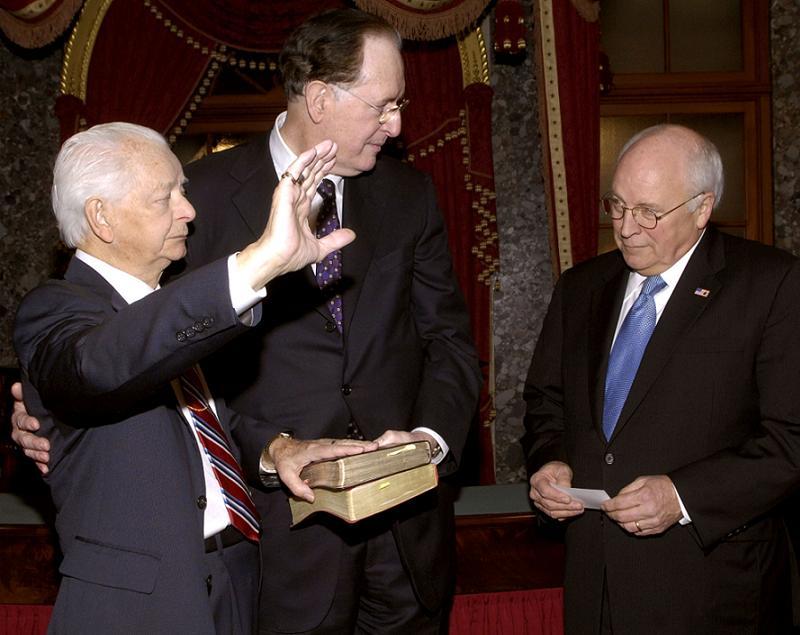
Robert Byrd being sworn into office. Image Source: Wikimedia Commons
In fairness to Byrd–and by extension to anybody who lives long enough to see the world change out of recognition three times over during his lifetime–he seems to have genuinely regretted his past.
By age 80, Byrd was offering public apologies for his role in organizing the KKK in West Virginia. Byrd was never really pressed about the record-setting filibusters he took part in, along with Strom Thurmond, to strangle Civil Rights bills in their cradle in the 1950s, so he never got the chance to apologize for that. Byrd died peacefully in 2010, aged 92, still in office.
A Study in Contrast: Senator Theodore Bilbo and Rep. David Duke
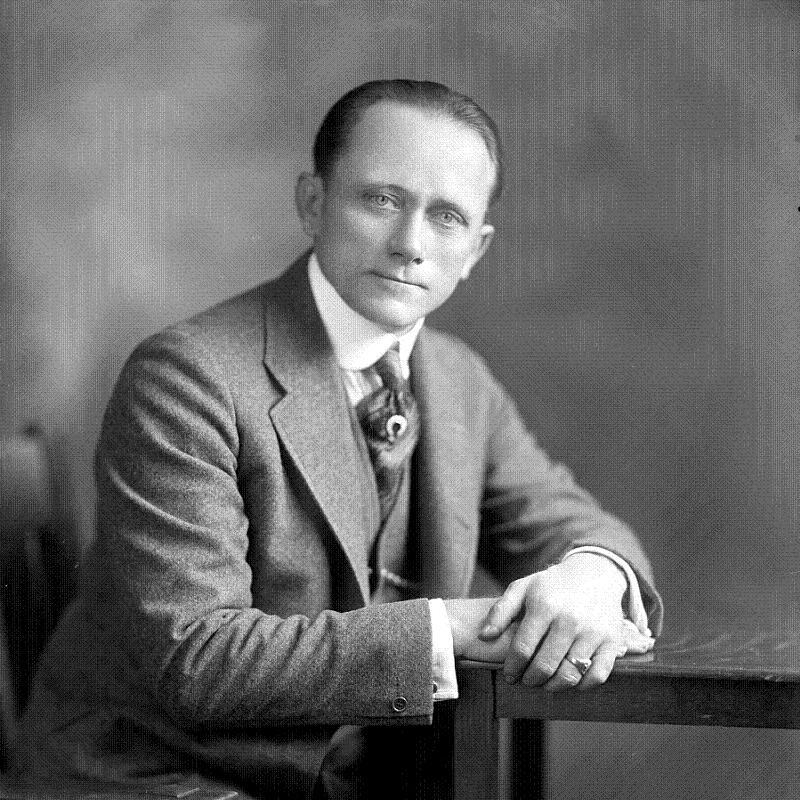
Theodore Bilbo. Image Source: Wikimedia Commons
Attitudes toward the KKK have dramatically changed over the years, as shown by the contrasting arcs of two public figures separated by just half a century: Theodore Bilbo and David Duke.
During his multiple terms of office, as both a governor and senator from Mississippi in the early 20th century, Theodore Bilbo’s name became synonymous with racism in America. Renowned journalist H. L. Mencken even coined the term “Bilboism” for the kind of official prejudice Bilbo campaigned on.
In 1938, he tried to amend the federal work-relief bill in the Senate with a provision to deport 12 million black Americans to Liberia. That same year, facing the prospect of a federal anti-lynching bill, Bilbo argued:
“If you succeed in the passage of this bill, you will open the floodgates of hell in the South. Raping, mobbing, lynching, race riots, and crime will be increased a thousandfold; and upon your garments and the garments of those who are responsible for the passage of the measure will be the blood of the raped and outraged daughters of Dixie, as well as the blood of the perpetrators of these crimes that the red-blooded Anglo-Saxon White Southern men will not tolerate.”
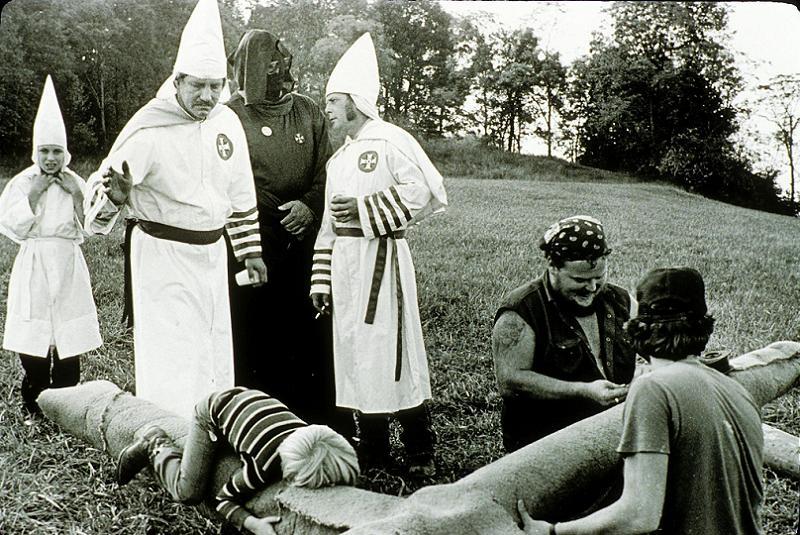
Image Source: Wikimedia Commons
Near the end of his life, Bilbo appeared on the radio program Meet the Press and admitted to having been a lifelong KKK member.
With the air of a man stating a solemn principle, he claimed: “No man can leave the Klan. He takes an oath not to do that. Once a Ku Klux, always a Ku Klux.” Today, a statue of Theodore Bilbo adorns the room in the Mississippi Capitol where the Legislative Black Caucus holds meetings. It is reportedly used as a coat rack.
In stark contrast to Bilbo’s generally successful career stands the four-decade career of David Duke. Like Bilbo, Duke is a Southern politician. Unlike Bilbo, Duke has been generally unsuccessful in winning public office with the exception of a single term as a U.S. Representative from his adopted state of Louisiana.
In 1974 at the age of 24, David Duke joined and quickly rose to the top of the KKK. Unlike Bilbo, who kept his membership relatively quiet but made bloodcurdling speeches from the floor of Congress, Duke was always open about his involvement with the KKK, but he worked to essentially launder the organization’s public image.
Rather than holding shadowy secret ceremonies and preaching bloodshed and murder, Duke encouraged members of the Knights of the KKK (which he founded) to wear business suits and appropriate the language of the Civil Rights movement to describe the “predicament” of white Americans. He even changed his title from Grand Wizard to the less cultish “National Director.” The idea seems to have been to mainstream the KKK in society and politics.
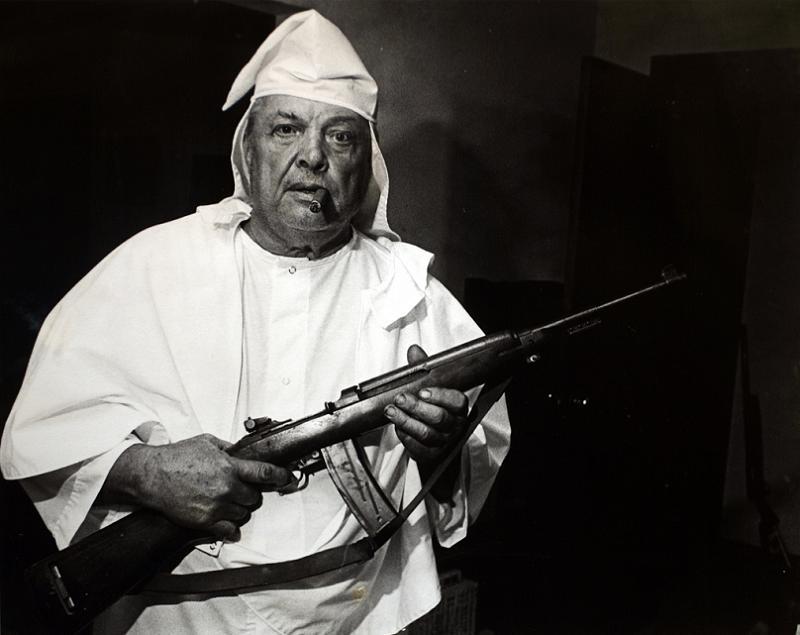
Image Source: Wikimedia Commons
If mainstreaming the KKK was Duke’s plan, he could not have failed more spectacularly. During his tenure as “National Director,” Klan membership nosedived to its present 5,000-8,000. The national organization was sued out of existence by the Southern Poverty Law Center, to be replaced with hundreds of officially independent Klaverns, few of which have three-digit membership.
Association with the KKK destroyed David Duke’s political ambitions. During the 1988 presidential election, Duke’s sole victory was in the New Hampshire vice presidential primary. Running in 11 states on the Populist ticket, he won just shy of 50,000 votes–in a race that saw 91.5 million votes cast. Libertarian candidate Ron Paul got 10 times Duke’s vote tally.
Duke’s electoral humiliations didn’t end there: after winning a 1989 special election to the House, Duke lost his 1990 bid for the Senate when his own Republican Party conceded the election to a Democrat rather than let Duke run on their ticket.
In 1991, Duke lost his bid to become Governor of Louisiana. In 1992, he again failed to poll at one percent in the Republican presidential primaries. In 1996, voters rejected his second bid for the Senate. In 1999, he came third in a special election for the House.
That year, at 49 years old, Duke retired from electoral politics. In 2005, he “earned” his history “Ph.D” from a Ukrainian “university.” His dissertation was titled: “Zionism as a Form of Ethnic Supremacism.” At present, it seems unlikely that David Duke will ever be commemorated with a statue, not even one that doubles as a coat rack.
Famous KKK Members: Supreme Court Justice Hugo Black
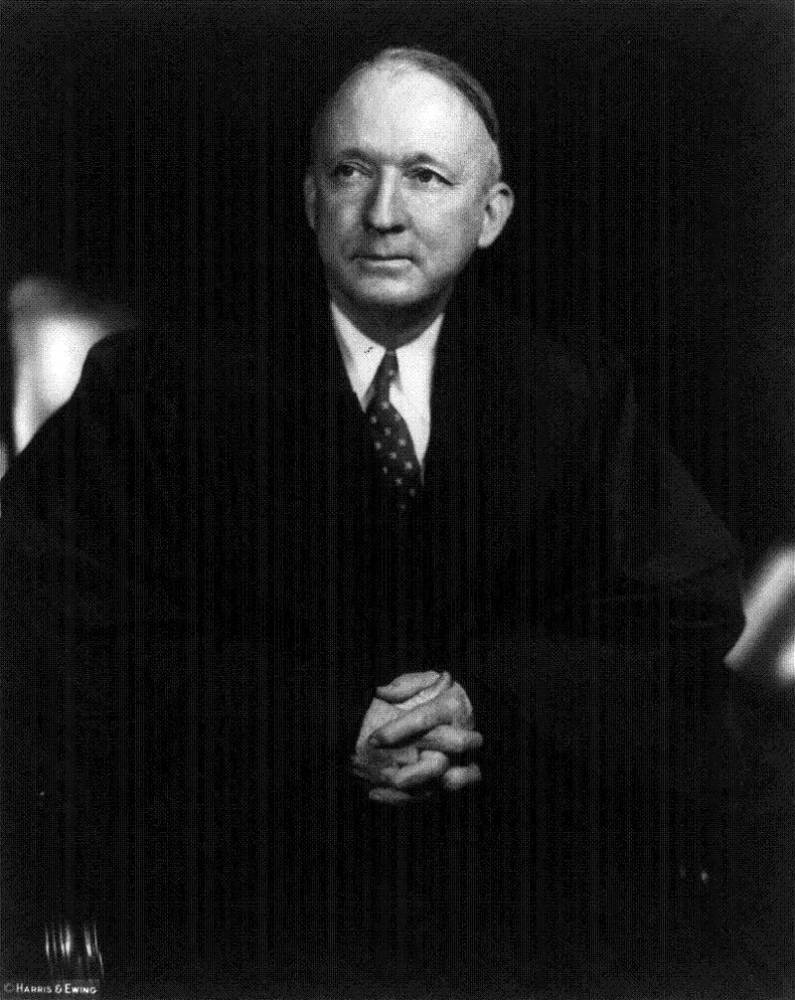
Former Supreme Court justice Hugo Black. Image Source: Wikimedia Commons
While the youthful indiscretions of presidents and congressmen are sometimes overlooked–as long as they have a good tax plan–the nine justices of the Supreme Court are supposed to (at least theoretically) be held to a higher standard. Which is what makes it uncomfortable to know that one of the Court’s 20th-century superstars, Hugo Black, was a former Klansman.
Unlike the other former Klansmen in public service, however, Hugo Black went far beyond tepid apologies and really made amends for his earlier politics. In fact, it was said of Black that in his youth he dressed in white robes and scared black folks, in his later years he dressed up in black robes and scared white folks.
Black started out as a country lawyer who fell backwards into politics in 1921 when he defended a Klansman accused of killing a Catholic priest in what was an obvious hate crime. Sensing opportunity, Black joined the Alabama KKK. Later, Black admitted that he “would have joined any group if it helped get me votes.” Black was elected to the Senate in 1927.
While in Congress, Black seems to have had a change of heart. While his early legislative career was marred by virulent opposition to anti-lynching bills, Black later became a rabid New Dealer and enthusiastic supporter of Roosevelt. In 1937, Black’s loyalty was rewarded with appointment to the Supreme Court.
The nomination was not without controversy; Black was the first senator nominated for the Court to face actual confirmation hearings since 1853. Six months after his confirmation, Black’s KKK affiliations were exposed in a Pulitzer Prize-winning series of newspaper articles.
Black never denied or minimized his past, but he made up for it with vigor. As early as 1940, Black was instrumental in reversing the convictions of black defendants whose due process rights had been violated. Later, he became a voice in the wilderness for opposing the Red Scare laws that practically banned the Communist Party.
He voted with the majority in Brown v. Board of Education to desegregate schools, and he joined the unanimous decision to retry the men accused (and later convicted) of killing three civil rights activist Freedom Riders, whose cases had earlier been dismissed by a Mississippi state court.
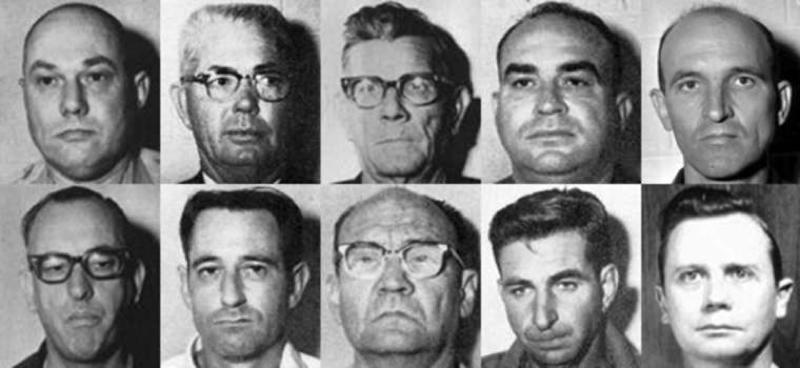
The conspirators in the Freedom Summer murders. On the bottom-left is Edgar Ray Killen. In 2005, he was sentenced to 60 years for the killings. He is tentatively scheduled for release in 2033, at age 108. Image Source: Wikimedia Commons
As a justice, Black was instrumental in killing segregation across the United States. In one ruling after another, his opposition to Jim Crow was a given in virtually every civil rights case the Court heard between the 1940s and his retirement in 1971.
With the exception of the Korematsu v. the United States, in which he voted with the majority to uphold Japanese internment (which he seems to have done largely because of his limited view of the Court’s authority; that is, on procedural grounds, rather than political or moral grounds), Black practically set the standard for liberal jurisprudence and paved the way toward a genuinely peaceful future for Americans of all races.

The Hugo Black United States Courthouse in Birmingham, Alabama. Image Source: Wikimedia Commons
Were Some U.S. Presidents President? Maybe
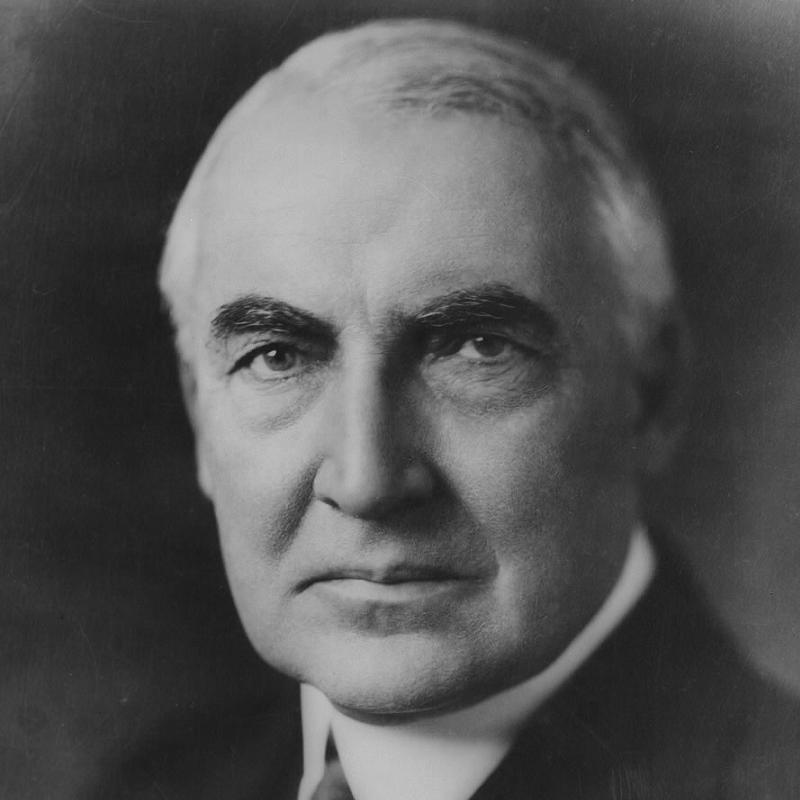
Former U.S. President Warren G. Harding. Image Source: Wikimedia Commons
The Ku Klux Klan used to be a really big deal. Operating from strongholds in the South and Midwest, the group practically defined state and national politics for those regions from about the time of World War I until the group’s scandal-plagued collapse a dozen years later.
So it’s not at all unexpected that some of that era’s most successful politicians used the support of the KKK as a stepping-stone to higher office. It is, however, upsetting that so many U.S. presidents seem to have passed through the KKK machinery:
Harry Truman: The case for Harry Truman’s membership in the KKK is relatively strong. The KKK was powerful in Missouri during exactly the years when Give ’em Hell Harry was starting out in national politics.
According to his own later account, Truman–who was then a judge seeking reelection–paid the KKK’s $10 membership fee on the advice of supporters. Apparently, Truman almost immediately quarreled with the Klan over its vitriolic hatred of Catholics.
Officially, this was because Truman respected and admired the Irish Catholics he had served with during the war. Less officially, Truman’s early campaigns were heavily funded by the staunchly Catholic Pendergast family of Missouri. Whatever the reason, Truman seems to have fallen out with the KKK early and demanded his membership fee back. It should also be noted that, as president, Harry Truman issued the first executive order for the racial integration of the military.
Woodrow Wilson: Woodrow Wilson is a much more likely candidate for KKK membership than almost anyone else on this list. During his two terms in office, Wilson did more than any other man to segregate the federal government. His antipathy to equal rights for blacks extended to a purge of the Executive branch that saw practically all nonwhite federal employees driven from leadership positions. Wilson even required applicants for government jobs to submit photographs with their resumes, the better to weed out undesirables.
Wilson would almost certainly have made an excellent Klansman. Unfortunately for the KKK, Woodrow Wilson reached the pinnacle of his career several years before the organization became a major player in national politics. Though he definitely had sympathy for the KKK’s stated objectives, no evidence exists that Wilson ever actually took the oath and joined the KKK.
Warren G. Harding: It is well known that President Warren G. Harding was sworn into the KKK in a secret ceremony in the White House. And like most well-known things, this seems to not actually be true.
Not only was Harding’s alleged membership in the KKK never mentioned in the contemporary records of anybody who knew him, his public opposition to anti-Catholic agitation and his vehement support for anti-lynching laws, make him seem like an unlikely recruit. In fact, the only evidence that Harding was a Klansman comes from the deathbed confession of a former Grand Wizard, who may have made the whole thing up to get even with Harding for the late President’s anti-racist public stance.
Calvin Coolidge: Calvin Coolidge succeeded Warren G. Harding as president, and he was also claimed by many KKK sources as a member. Even today, Coolidge is reported to have been a lifelong member by multiple websites we aren’t linking to here. This claim stretches credulity, however. Coolidge not only snubbed the KKK’s invitation to address its Washington rally, a short time later he spoke on religious tolerance to a large group of Catholics in Washington.
He also replied to an angry protest from a Klansman over a black Congressional candidate with a letter that included, among other things, this passage:
During the war 500,000 colored men and boys were called up under the draft, not one of whom sought to evade it. They took their places wherever assigned in defense of the nation of which they are just as truly citizens as are any others. The suggestion of denying any measure of their full political rights to such a great group of our population as the colored people is one which, however it might be received in some other quarters, could not possibly be permitted by one who feels a responsibility for living up to the traditions and maintaining the principles of the Republican Party.
Our Constitution guarantees equal rights to all our citizens, without discrimination on account of race or color, I have taken my oath to support that Constitution. It is the source of your rights and my rights. I propose to regard it, and administer it, as the source of the rights of all the people, whatever their belief or race. A colored man is precisely as much entitled to submit his candidacy in a party primary, as is any other citizen. The decision must be made by the constituents to whom he offers himself, and by nobody else.
It is difficult to square this rebuke with Coolidge’s alleged KKK membership.





